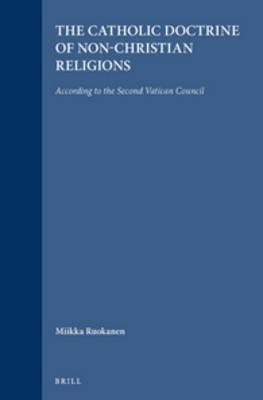Overview
In the Second Vatican Council (1962-65) the Catholic Church for the first time recognized non-Christian religions as entities which the Church should respect and with which Christians should enter into dialogue. There are, however, conflicting views in Catholic interpretations of Conciliar theology: to what extent did the Council see other religions as means to salvation? This is a comprehensive and analytic research work on Conciliar teaching concerning the nature of other faiths, based on the original Latin and covering Conciliar and pre-Conciliar documents, with special focus on the ""Declaration on the Relation of the Church to non-Christian Religions (Nostra Aetate)"". Ruokanen demonstrates that Vaticanum Secundum understood non-Christian religions as naturally good entities, part of human culture. Religions express in many ways, and to varing degrees, the natural cognition of God and of natural moral law. Except for Judaism, they do not, however, possess the status of being considered channels of divine revelation or salvific grace. The seeds of truth present in other faiths must be purified and perfected by the fullness of grace and truth given in Christ and entrusted to the Church.
Full Product Details
Author: Miikka Ruokanen
Publisher: Brill
Imprint: Brill
Volume: 7
Dimensions:
Width: 15.50cm
, Height: 1.40cm
, Length: 23.50cm
Weight: 0.408kg
ISBN: 9789004095175
ISBN 10: 9004095179
Pages: 172
Publication Date: 01 January 1992
Audience:
College/higher education
,
Professional and scholarly
,
Postgraduate, Research & Scholarly
,
Professional & Vocational
Format: Hardback
Publisher's Status: Active
Availability: Manufactured on demand

We will order this item for you from a manufactured on demand supplier.
Reviews
Listed as one of 'Fifteen Outstanding Books of 1992' by the International Bulletin of Missionary Research. 'Any researcher focused on the theological debate about religions will necessarily consult his comprehensive work.' James H. Kroeger, Missiology, 1994. '...it is extremely helpful to have this detailed study...' Kenneth Cracknell, International Review of Mission. 'Ruokanen's study is extremely readable, and will be of use to audiences ranging from the parish to the graduate seminar.' Kenn R. Trembath, JAAR/JBL, 1994. 'This text is a clear presentation of an important corrective to many interpretations of Nostra aetate.' Regina A. Boisclair, Journal of Ecumenical Studies, 1994.
Listed as one of 'Fifteen Outstanding Books of 1992' by the International Bulletin of Missionary Research. 'Any researcher focused on the theological debate about religions will necessarily consult his comprehensive work.' James H. Kroeger, Missiology, 1994. '...it is extremely helpful to have this detailed study...' Kenneth Cracknell, International Review of Mission. 'Ruokanen's study is extremely readable, and will be of use to audiences ranging from the parish to the graduate seminar.' Kenn R. Trembath, JAAR/JBL, 1994. 'This text is a clear presentation of an important corrective to many interpretations of Nostra aetate.' Regina A. Boisclair, Journal of Ecumenical Studies, 1994.
Listed as one of 'Fifteen Outstanding Books of 1992' by the International Bulletin of Missionary Research . ' Any researcher focused on the theological debate about religions will necessarily consult his comprehensive work. ' James H. Kroeger, Missiology , 1994. ' ...it is extremely helpful to have this detailed study... ' Kenneth Cracknell, International Review of Mission . ' Ruokanen's study is extremely readable, and will be of use to audiences ranging from the parish to the graduate seminar. ' Kenn R. Trembath, JAAR/JBL , 1994. ' This text is a clear presentation of an important corrective to many interpretations of Nostra aetate.' Regina A. Boisclair, Journal of Ecumenical Studies , 1994.
Author Information
Miikka Ruokanen, Th.D. (1983), University of Helsinki, is Lecturer of Dogmatics at the University of Helsinki. His publications include Hermeneutics as an Ecumenical Method in the theology of Gerhard Ebeling (1982), Doctrina divinitus inspirata, Martin Luther's Position in the Ecumenical Problem of Biblical Inspiration (1985), and several articles in English, German and Finnish.



